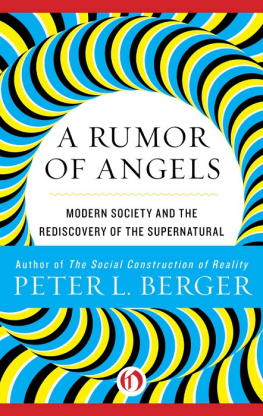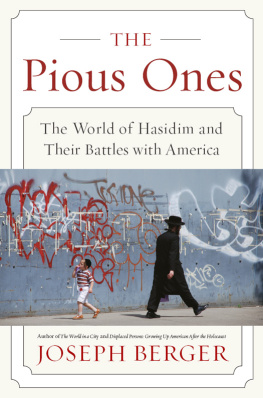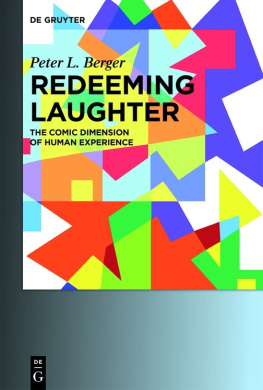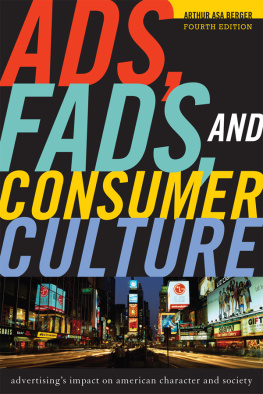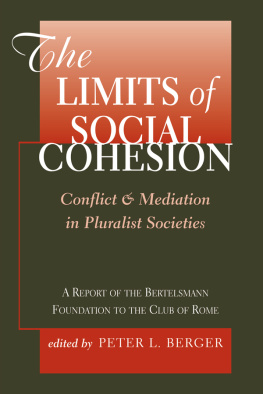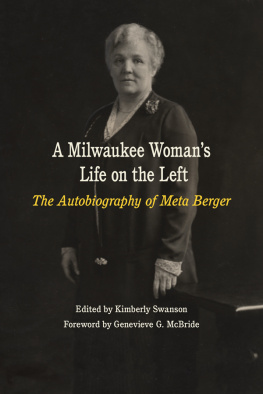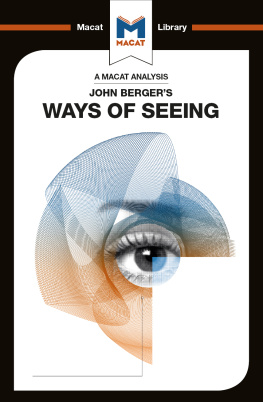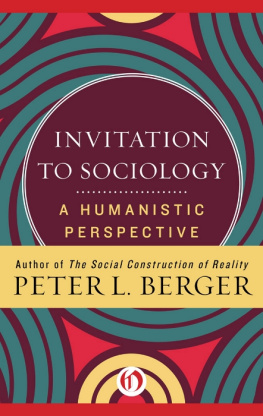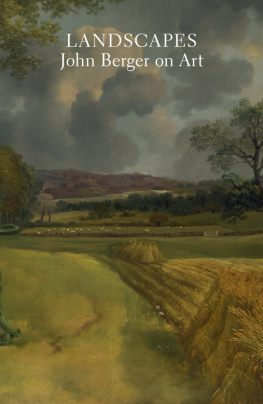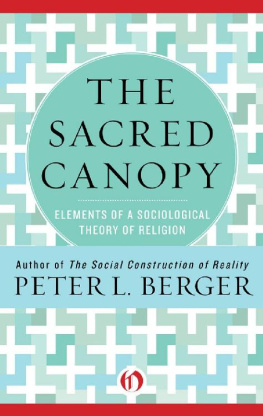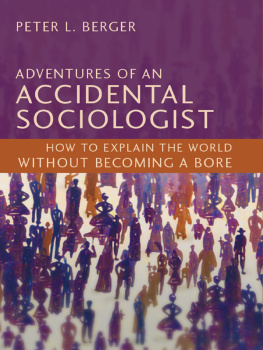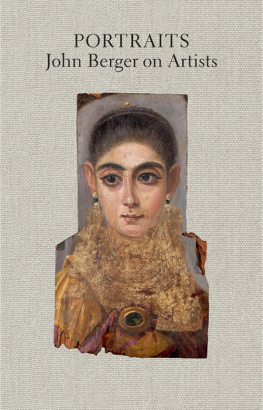
A RUMOR OF ANGELS
Modern Society and the Rediscovery of the Supernatural
Peter L. Berger

TO THE MEMORY OF
FREDERICK NEUMANN
18991967
Preface
THIS BOOK IS CONCERNED with the possibility of theological thinking in our present situation. It asks whether such thinking is possible at all today and, if so, in what way. The first question is answered affirmatively, and the answer is, up to a point, supported by an argument that derives from sociology. In the very tentative approaches made to an answer of the second question, sociology is of little if any use. It should, therefore, be very clear that I can claim no authority as a sociologist for a good deal of what follows here. This means that Im sticking my neck out in the most blatant way, and I should probably explain my motives.
In a recent book, The Sacred CanopyElements of a Sociological Theory of Religion (Garden City, N.Y., Doubleday, 1967), I attempted to summarize what seem to me to be certain essential features of a sociological perspective on religion and I tried to apply this perspective to an analysis of the contemporary religious situation. I have been trained in a sociological tradition shaped by Max Weber and so I tried, to the best of my ability, to keep my statements value-free. The result was a theoretical work that, quite apart from the technical jargon in which it had to be presented, read like a treatise on atheism, at least in parts. The analysis of the contemporary situation with which it ended could easily be read (and, as far as my intentions were concerned, misread) as a counsel of despair for religion in the modern world. For better or for worse, my self-understanding is not exhausted by the fact that I am a sociologist. I also consider myself a Christian, though I have not yet found the heresy into which my theological views would comfortably fit. All this made me uneasy about the possible effect of The Sacred Canopy upon the unwary reader and so I added an appendix that dealt with some possible theological implications of the books argument. This way out did not satisfy me, and the present book is the result of this dissatisfaction.
In what follows I try to say what I have to say as simply as I can and without forcing the reader to go first through the conceptual and terminological apparatus with which I habitually carry on my business as a sociologist. I have found a few technical terms indispensable, but I have tried to keep these to a minimum. This book, then, is not particularly addressed to sociologists and does not presuppose the debatable benefits of a sociological education. It is addressed to anyone with a concern for religious questions and the willingness to think about them systematically. I hope that it may have something to say to theologians, though Im fully aware of my lack of expertise in theology. In view of the non-technical (Im tempted to say unprofessional) character of the book, I have also kept the notes to a minimum and almost entirely limited them to references in English. The relatively frequent references to previous writings of my own should in no way be construed as a conviction on my part that these writings are terribly important or as advice to the reader to go back to them. But every process of thinking must be a conversation with oneself and particularly with ones previous thought, and one cannot at each step start all over again from the beginning. Not to have to do this should perhaps be one of the fringe benefits of having written more than one book.
I suppose one sticks ones neck out when it comes to things one deems important. I think that religion is of very great importance at any time and of particular importance in our own time. If theologizing means simply any systematic reflection about religion, then it would seem plausible to regard it as too important to leave to the theological experts. Ergo, one must stick out ones neck. This implies impertinence as well as modesty. To try at all may well be impertinent. This should make it all the clearer that the effort is tentative and the result unfinished.
Some of the ideas that follow were discussed at length with Richard Neuhaus. I would like to express my great appreciation of his interest and suggestions on these occasions.
I have dedicated this book to my first teacher in theology. I know that he would not have liked many of its conclusions, but I venture to hope that he would have approved the basic intention.
P. L. B.
New York, Fall 1968
1. The Alleged Demise of the Supernatural
IF COMMENTATORS ON THE contemporary situation of religion agree about anything, it is that the supernatural has departed from the modern world. This departure may be stated in such dramatic formulations as God is dead or the post-Christian era. Or it may be undramatically assumed as a global and probably irreversible trend. Thus the radical theologian Thomas Altizer tells us with the solemnity of a confessional pronouncement that we must realize that the death of God is an historical event, that God has died in our cosmos, in our history, in our Existenz.
The departure of the supernatural has been received in a variety of moodswith prophetic anger, in deep sorrow, with gleeful triumph, or simply as an emotionally unprovocative fact. But the spokesman of traditional religion who thunders against a godless age, the progressive intellectual who hails its coming, and the dispassionate analyst who merely registers it have in common the recognition that such, indeed, is our situationan age in which the divine, at least in its classical forms, has receded into the background of human concern and consciousness.
The term supernatural has been justly criticized on a number of grounds. Historians of religion and cultural anthropologists have pointed out that the term suggests the division of reality into a closed system of rationally comprehensible nature and a mysterious world somehow beyond it, a peculiarly modern conception, which is misleading if one seeks to understand the religious notions of primitive or archaic cultures. Biblical scholars have criticized the term as failing to convey the concreteness and historical character of the Israelite religious experience, and Christian theologians attacked it as offending the world-affirming implications of the doctrine of the incarnation, if not indeed of the doctrine of creation. Nevertheless the term, particularly in its everyday usage, denotes a fundamental category of religion, namely the assertion or belief that there is an other reality, and one of ultimate significance for man, which transcends the reality within which our everyday experience unfolds. It is this fundamental assumption about reality, rather than this or that historical variation of it, that is allegedly defunct or in the process of becoming defunct in the modern world.
The historian of religion Rudolf Otto, in The Idea of the Holy (originally published in German in 1917) attempted what may still be regarded as a definitive description of this otherness of religious experience. Otto emphasized that the sacred (that is, the reality man believes he encounters in religious experience) is totally other than ordinary, human phenomena, and in this otherness the sacred impresses man as an overwhelming, awesome, and strangely fascinating power.
As one might expect, there has been extensive controversy since then as to the validity of Ottos delineation of the sacred as the religious category par excellence in all cultures. Once more, however, these scholarly debates may be left aside. Instead, let us look at the ordinary world, which some philosophers have called the
Next page
